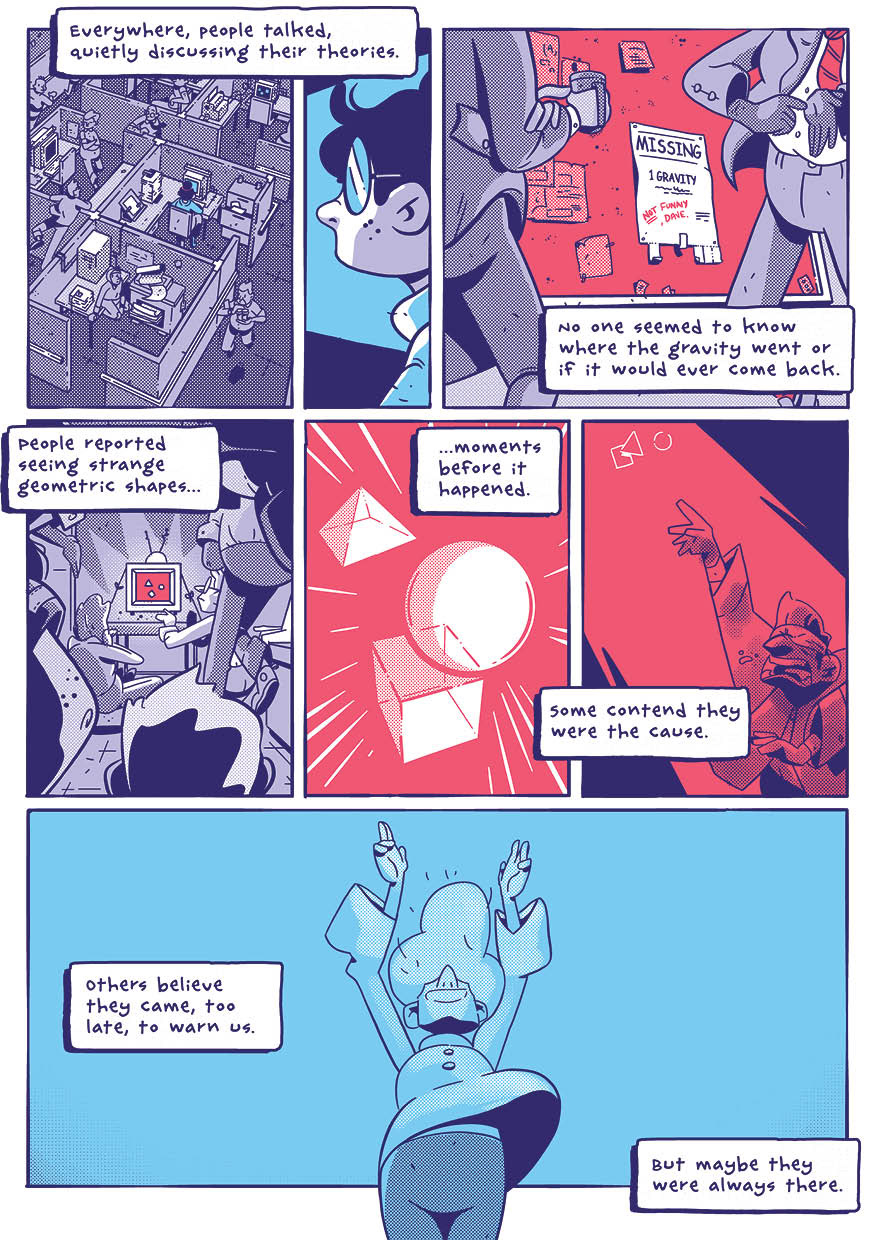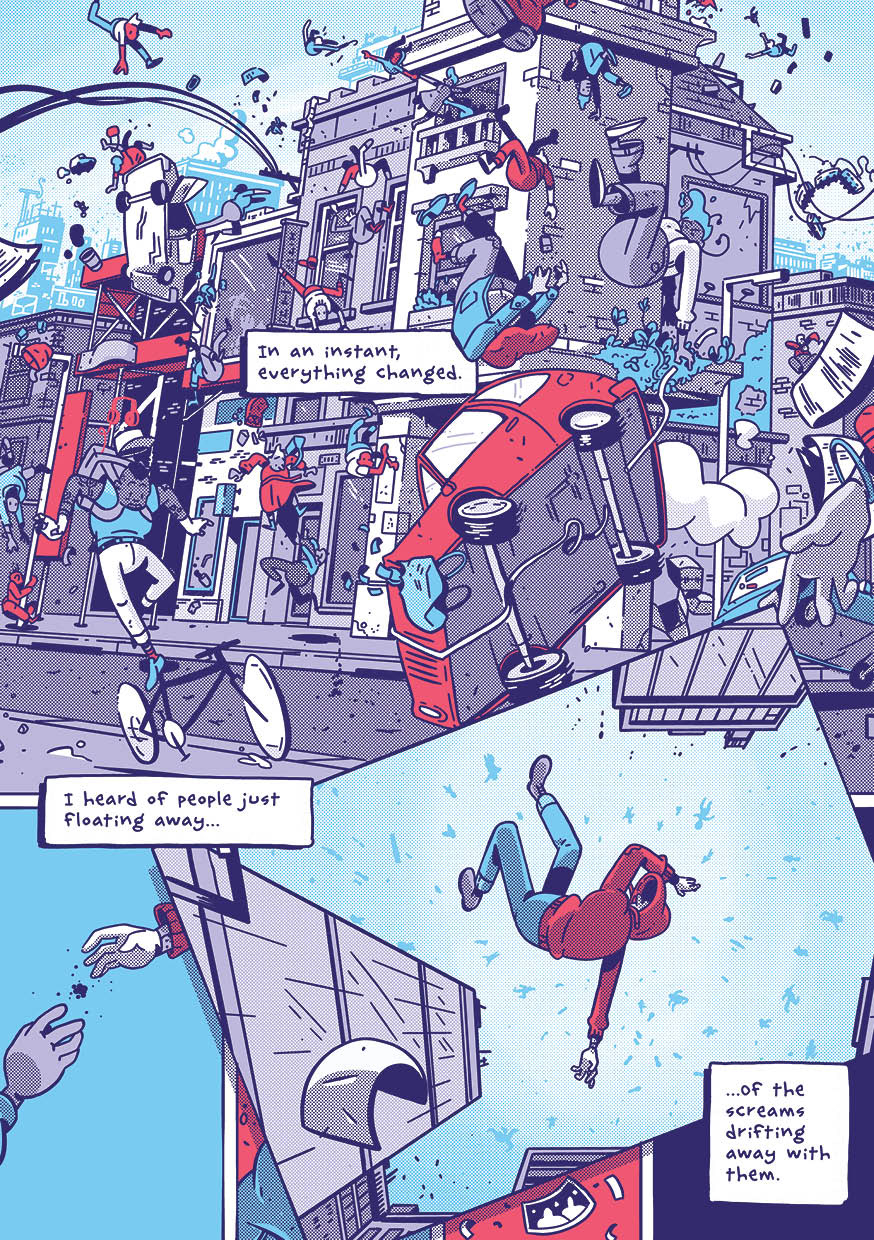The copyright notice to this comic is unique. It reads, “Copyright (C) 2020 Chris Baldie. All rights reserved. This book or any portion thereof may not be reproduced or used in any manner whatsoever without the express written permission of me, Chris Baldie, the all-powerful Creator, except for the use of brief quotations in a book review. But even then, it better be a good review...” We have endeavoured to comply.
We Said Goodbye to Gravity is an independent publication by creator Chris Baldie. The introductory page notes that Mr Baldie (or rather, a cartoon representation of Mr Baldie, eating a sandwich) created the comic during the first year of the 2020 global pandemic, and, “[a] lot happened in between those 10 months that may or may not be reflected in the tone of these comics.” Here is his promotional blurb, from Kickstarter:
We Said Goodbye To Gravity is a collection of 6 short stories over 32 pages, not a single one of which is about Covid or being in lockdown. None of the content is explicit or unsuitable for older children, but some of the subtext may be lost on younger kids. Personally I think it’s some of my better work, but I’ll let you be the judge of that.
There’s not much explanation in that, and we are happy to expand. The title consists of six vignettes. One of them, is extremely short – two pages, consisting of five panels, entitled “What happened to Sergeant Rackham?” expounding the mystery of a dead astronaut. A cartoon bitemark on a floating glove suggests a gory fate. But it is less an Alien-esque rip-and-tear than a Looney Tunes munch from Henery Hawk https://en.wikipedia.org/wiki/Henery_Hawk. The single panel bite is rendered in a totally innocuous and cartoonish way, and as such, provoked a barking laugh from your reviewer.
The longest story, entitled “Anthropology”, contains a menace which lurks at the corner of your eyes. The tale contains no dialogue, and the art is coloured in tones of electric blue. A small, somewhat cute robot wearing clothes, a cap, and a backpack meanders through an abandoned and overgrown city, pulling a cart. There is something innocent, happy, and decidedly boyish about the robot as it trundles about. He (we anthropomorphise the robot) stumbles into a library, and we learn that he collects various random, abandoned items – photos, plastic forks, headphones, and old teddy bears. The sudden discovery of a human skeleton surprises him. The robot’s interaction with the skeleton, and a book which the skeleton clutches, are contrasted with the sunshine on the robot’s cheerful face as he ventures out again into the ruins. The robot cannot relate to the dead human – the body means nothing to him other than as a curiosity. The robot cannot dream, and he sees his encounter with the corpse as nothing more than an interlude in his happy day. It is a dire story masquerading as a whimsy.
The second last story is the title story. It proposes a day went gravity no longer works and people slowly drift off into the sky unless they take basic precautions to strap down. But, as the nameless protagonist notes, “What if it wasn’t an accident? What if the saw a moment… and simply… let go?” Initially, we read too much into this story, and assumed it was about depression and suicide. A re-read leads us to the conclusion that it is an absurdist comedy, albeit with a dark subtext.


The final story, “Great Expectations”, sees a scientist gaze into the multiverse and suffer the fate promised by German philosopher Friedrich Nietzsche of gazing into the abyss. There is another dimension, then, where Mr Baldie did not write We Said Goodbye to Gravity, and it is poorer for it.

